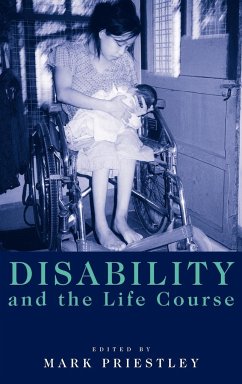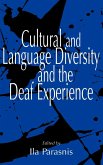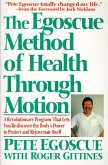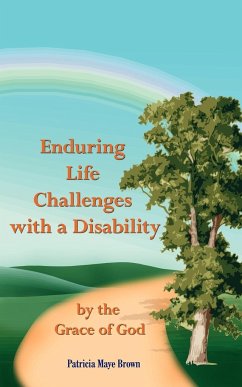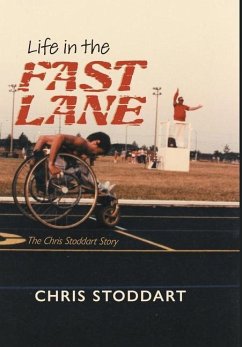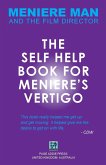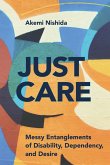- Gebundenes Buch
- Merkliste
- Auf die Merkliste
- Bewerten Bewerten
- Teilen
- Produkt teilen
- Produkterinnerung
- Produkterinnerung
First published in 2001, this book explores the global experience of disability using a novel life course approach.
Andere Kunden interessierten sich auch für
![Cultural and Language Diversity and the Deaf Experience Cultural and Language Diversity and the Deaf Experience]() Ila Parasnis (ed.)Cultural and Language Diversity and the Deaf Experience121,99 €
Ila Parasnis (ed.)Cultural and Language Diversity and the Deaf Experience121,99 €![The Egoscue Method of Health Through Motion The Egoscue Method of Health Through Motion]() Pete EgoscueThe Egoscue Method of Health Through Motion15,99 €
Pete EgoscueThe Egoscue Method of Health Through Motion15,99 €![Enduring Life Challenges with a Disability Enduring Life Challenges with a Disability]() Patricia Maye BrownEnduring Life Challenges with a Disability12,99 €
Patricia Maye BrownEnduring Life Challenges with a Disability12,99 €![Life in the Fast Lane: The Chris Stoddart Story Life in the Fast Lane: The Chris Stoddart Story]() Chris StoddartLife in the Fast Lane: The Chris Stoddart Story31,99 €
Chris StoddartLife in the Fast Lane: The Chris Stoddart Story31,99 €![Meniere Man. The Self-Help Book For Meniere's Vertigo. Meniere Man. The Self-Help Book For Meniere's Vertigo.]() Meniere ManMeniere Man. The Self-Help Book For Meniere's Vertigo.16,99 €
Meniere ManMeniere Man. The Self-Help Book For Meniere's Vertigo.16,99 €![Just Care Just Care]() Akemi NishidaJust Care104,99 €
Akemi NishidaJust Care104,99 €![Meniere Man. The Self-Help Book For Meniere's Vertigo. Meniere Man. The Self-Help Book For Meniere's Vertigo.]() Meniere ManMeniere Man. The Self-Help Book For Meniere's Vertigo.17,99 €
Meniere ManMeniere Man. The Self-Help Book For Meniere's Vertigo.17,99 €-
-
-
First published in 2001, this book explores the global experience of disability using a novel life course approach.
Hinweis: Dieser Artikel kann nur an eine deutsche Lieferadresse ausgeliefert werden.
Hinweis: Dieser Artikel kann nur an eine deutsche Lieferadresse ausgeliefert werden.
Produktdetails
- Produktdetails
- Verlag: Cambridge University Press
- Seitenzahl: 274
- Erscheinungstermin: 27. Mai 2011
- Englisch
- Abmessung: 235mm x 157mm x 21mm
- Gewicht: 600g
- ISBN-13: 9780521793407
- ISBN-10: 0521793408
- Artikelnr.: 29339309
- Herstellerkennzeichnung
- Libri GmbH
- Europaallee 1
- 36244 Bad Hersfeld
- gpsr@libri.de
- Verlag: Cambridge University Press
- Seitenzahl: 274
- Erscheinungstermin: 27. Mai 2011
- Englisch
- Abmessung: 235mm x 157mm x 21mm
- Gewicht: 600g
- ISBN-13: 9780521793407
- ISBN-10: 0521793408
- Artikelnr.: 29339309
- Herstellerkennzeichnung
- Libri GmbH
- Europaallee 1
- 36244 Bad Hersfeld
- gpsr@libri.de
Part I. Concepts: 1. Introduction: the global context of disability Mark
Priestley; 2. Repositioning disability and the life course: a social
claiming perspective Sarah Irwin; 3. Marginalisation and disability:
experiences from the Third World Anita Ghai; 4. Where do we draw the line?:
surviving eugenics in a technological world Gregor Wolbring; 5. A
complicated struggle: disability, survival and social change in the
majority world Emma Stone; Part II. Methods and Stories: 6. Life event
histories and the US independent living moment Devva Kasnitz; 7. A journey
of discovery Swapna McNeil; 8. Using life story narratives to understand
disability and identity in South Africa Ruth Morgan; 9. Social change and
self empowerment: stories of disabled people in Russia Elena
Iarskia-Smirnova; 10. Lifting the Iron Curtain Kaido Kikkas; 11. Revisiting
deaf transitions Mairian Corker; 12. The hidden injuries of 'a slight limp'
Devorah Kalekin-Fishman; Part III. The Politics of Transition: 13. Disabled
children: an emergency submerged Sue Philpott and Washeila Sait; 14.
Failing to make the transition? Theorising the 'transition to adulthood'
for young disabled people Kay Tisdall; 15. Breaking my head in the prime of
my life: acquired disability in young adulthood Allison Rowlands; 16. Work
and adulthood: economic survival in the majority world Majid Turmusani; 17.
The possibility of choice: women with intellectual disabilities talk about
having children Kelley Johnson, Rannveig Traustadóttir, Lyn Harrison, Lynne
Hillier and Hanna Björg Sigurjónsdóttir; 18. Ageing with disability in
Japan Miho Iwakuma; 19. Ageing with intellectual disabilities; discovering
disability with old age: same or different? Nancy Breitenbach; 20. Epilogue
Mark Priestley.
Priestley; 2. Repositioning disability and the life course: a social
claiming perspective Sarah Irwin; 3. Marginalisation and disability:
experiences from the Third World Anita Ghai; 4. Where do we draw the line?:
surviving eugenics in a technological world Gregor Wolbring; 5. A
complicated struggle: disability, survival and social change in the
majority world Emma Stone; Part II. Methods and Stories: 6. Life event
histories and the US independent living moment Devva Kasnitz; 7. A journey
of discovery Swapna McNeil; 8. Using life story narratives to understand
disability and identity in South Africa Ruth Morgan; 9. Social change and
self empowerment: stories of disabled people in Russia Elena
Iarskia-Smirnova; 10. Lifting the Iron Curtain Kaido Kikkas; 11. Revisiting
deaf transitions Mairian Corker; 12. The hidden injuries of 'a slight limp'
Devorah Kalekin-Fishman; Part III. The Politics of Transition: 13. Disabled
children: an emergency submerged Sue Philpott and Washeila Sait; 14.
Failing to make the transition? Theorising the 'transition to adulthood'
for young disabled people Kay Tisdall; 15. Breaking my head in the prime of
my life: acquired disability in young adulthood Allison Rowlands; 16. Work
and adulthood: economic survival in the majority world Majid Turmusani; 17.
The possibility of choice: women with intellectual disabilities talk about
having children Kelley Johnson, Rannveig Traustadóttir, Lyn Harrison, Lynne
Hillier and Hanna Björg Sigurjónsdóttir; 18. Ageing with disability in
Japan Miho Iwakuma; 19. Ageing with intellectual disabilities; discovering
disability with old age: same or different? Nancy Breitenbach; 20. Epilogue
Mark Priestley.
Part I. Concepts: 1. Introduction: the global context of disability Mark
Priestley; 2. Repositioning disability and the life course: a social
claiming perspective Sarah Irwin; 3. Marginalisation and disability:
experiences from the Third World Anita Ghai; 4. Where do we draw the line?:
surviving eugenics in a technological world Gregor Wolbring; 5. A
complicated struggle: disability, survival and social change in the
majority world Emma Stone; Part II. Methods and Stories: 6. Life event
histories and the US independent living moment Devva Kasnitz; 7. A journey
of discovery Swapna McNeil; 8. Using life story narratives to understand
disability and identity in South Africa Ruth Morgan; 9. Social change and
self empowerment: stories of disabled people in Russia Elena
Iarskia-Smirnova; 10. Lifting the Iron Curtain Kaido Kikkas; 11. Revisiting
deaf transitions Mairian Corker; 12. The hidden injuries of 'a slight limp'
Devorah Kalekin-Fishman; Part III. The Politics of Transition: 13. Disabled
children: an emergency submerged Sue Philpott and Washeila Sait; 14.
Failing to make the transition? Theorising the 'transition to adulthood'
for young disabled people Kay Tisdall; 15. Breaking my head in the prime of
my life: acquired disability in young adulthood Allison Rowlands; 16. Work
and adulthood: economic survival in the majority world Majid Turmusani; 17.
The possibility of choice: women with intellectual disabilities talk about
having children Kelley Johnson, Rannveig Traustadóttir, Lyn Harrison, Lynne
Hillier and Hanna Björg Sigurjónsdóttir; 18. Ageing with disability in
Japan Miho Iwakuma; 19. Ageing with intellectual disabilities; discovering
disability with old age: same or different? Nancy Breitenbach; 20. Epilogue
Mark Priestley.
Priestley; 2. Repositioning disability and the life course: a social
claiming perspective Sarah Irwin; 3. Marginalisation and disability:
experiences from the Third World Anita Ghai; 4. Where do we draw the line?:
surviving eugenics in a technological world Gregor Wolbring; 5. A
complicated struggle: disability, survival and social change in the
majority world Emma Stone; Part II. Methods and Stories: 6. Life event
histories and the US independent living moment Devva Kasnitz; 7. A journey
of discovery Swapna McNeil; 8. Using life story narratives to understand
disability and identity in South Africa Ruth Morgan; 9. Social change and
self empowerment: stories of disabled people in Russia Elena
Iarskia-Smirnova; 10. Lifting the Iron Curtain Kaido Kikkas; 11. Revisiting
deaf transitions Mairian Corker; 12. The hidden injuries of 'a slight limp'
Devorah Kalekin-Fishman; Part III. The Politics of Transition: 13. Disabled
children: an emergency submerged Sue Philpott and Washeila Sait; 14.
Failing to make the transition? Theorising the 'transition to adulthood'
for young disabled people Kay Tisdall; 15. Breaking my head in the prime of
my life: acquired disability in young adulthood Allison Rowlands; 16. Work
and adulthood: economic survival in the majority world Majid Turmusani; 17.
The possibility of choice: women with intellectual disabilities talk about
having children Kelley Johnson, Rannveig Traustadóttir, Lyn Harrison, Lynne
Hillier and Hanna Björg Sigurjónsdóttir; 18. Ageing with disability in
Japan Miho Iwakuma; 19. Ageing with intellectual disabilities; discovering
disability with old age: same or different? Nancy Breitenbach; 20. Epilogue
Mark Priestley.

